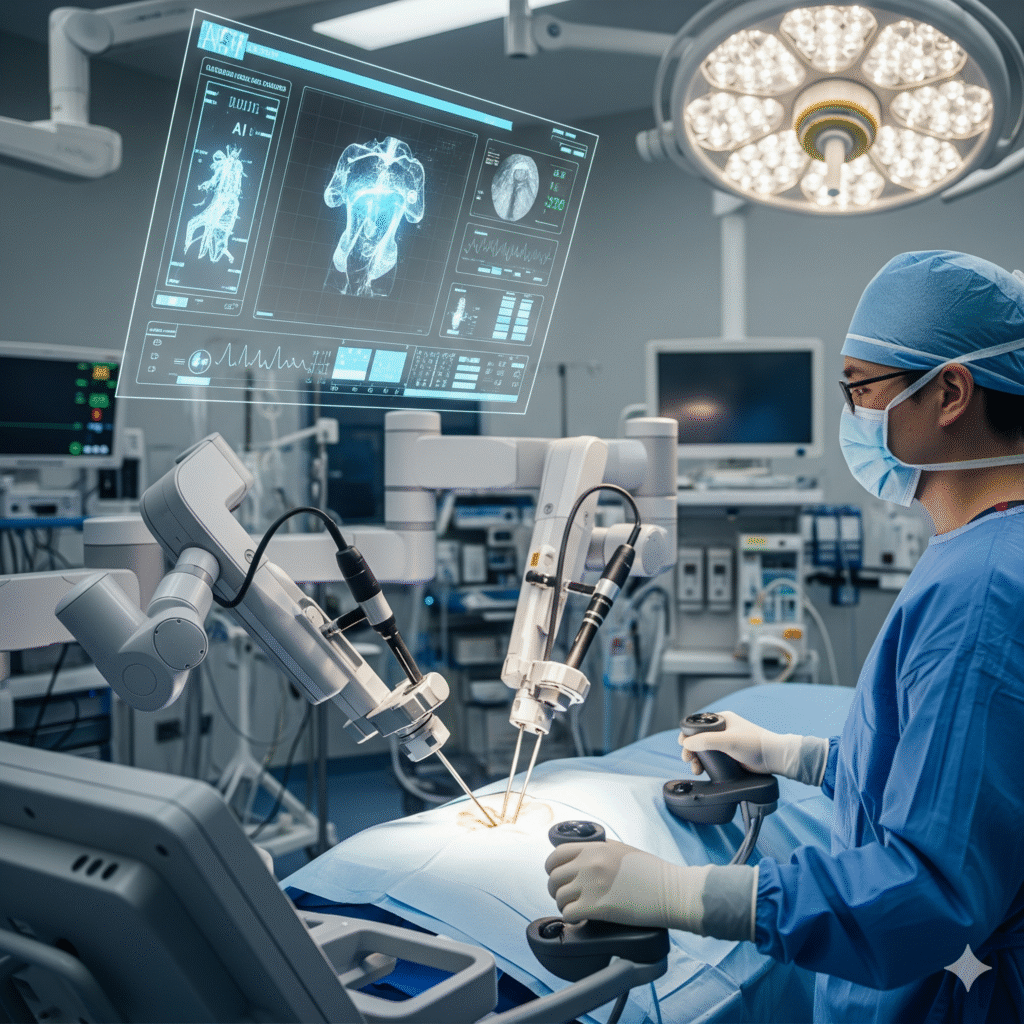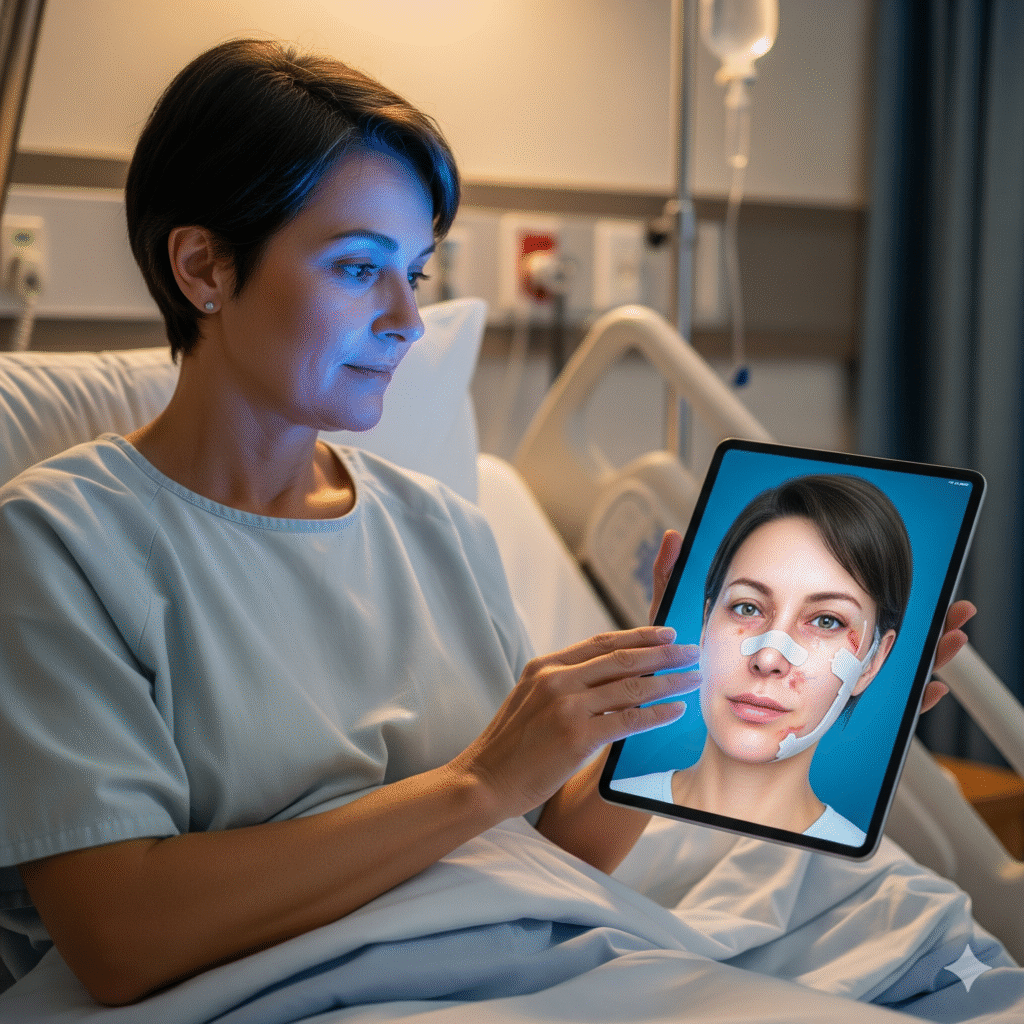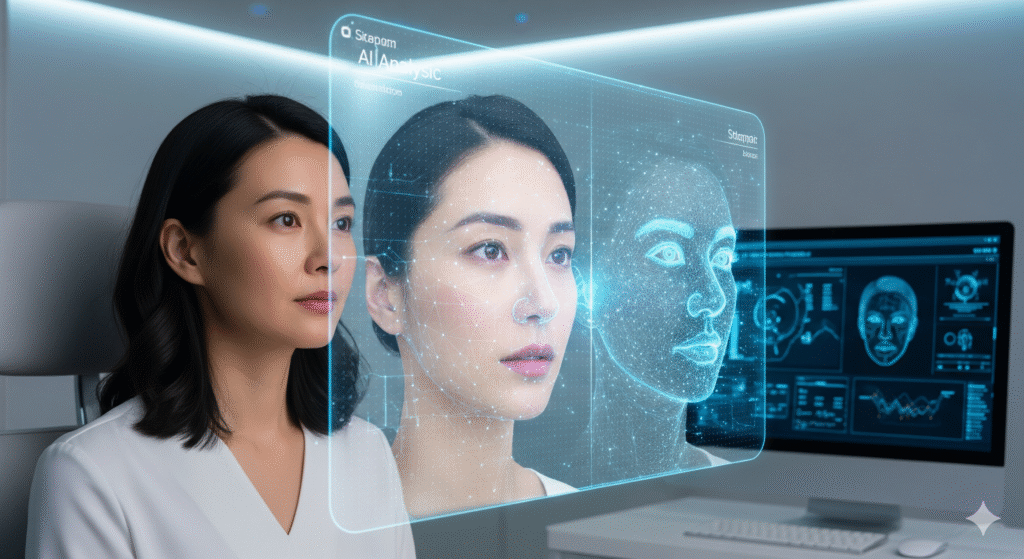Introduction
Plastic surgery has always been about blending art with science. But in 2025, a new player has entered the operating room: Artificial Intelligence (AI). From predicting post-surgery outcomes with shocking accuracy to using AI-powered robots for delicate procedures, the role of AI in plastic surgery is no longer science fiction.
💡 Imagine looking at your “future face” in 3D before surgery… AI makes this possible.

This blog explores the mind-blowing ways AI is reshaping plastic surgery, real-world case studies, apps you can try today, and practical steps to leverage AI for informed cosmetic decisions.
Why AI in Plastic Surgery is a Game-Changer
| Aspect | Traditional Method | With AI |
|---|---|---|
| Outcome Prediction | Based on surgeon’s experience & photos | 3D AI simulations with 95% accuracy |
| Safety | Manual pre-op risk assessments | AI scans medical history to flag risks early |
| Surgical Precision | Human-only execution | AI-assisted robotic tools for micro-precision |
| Recovery Monitoring | Manual check-ups | AI-powered apps track healing in real-time |
⚡ Shocking Insight: Studies show AI-assisted plastic surgeries reduce complication risks by up to 30%.
Case Studies & Real-World Examples
- Cleveland Clinic (USA) – Uses AI-driven imaging tools that allow patients to see post-surgery results virtually. This reduced patient dissatisfaction rates by 40%.
- Seoul, South Korea – Clinics leverage AI-powered facial symmetry analysis to recommend procedures. South Korea, already a plastic surgery hub, is seeing faster recovery rates with robot-assisted operations.
- Stanford Research (2023) – An AI tool predicted patient outcomes for rhinoplasty with 92% accuracy, compared to surgeons at 70%.
Real-World Example
See firsthand how AI is shaping surgical precision and patient outcomes:
AI Tools & Apps You Can Try Today
✅ FaceApp – Beyond filters, its AI simulations give you a glimpse of how you might look after nose reshaping or chin correction.
✅ Modiface (by L’Oréal) – Professional-grade AI visualization tool used by clinics for virtual try-ons.
✅ Illusio – A 3D simulation software that lets patients “try on” breast augmentation before surgery.
✅ SkinVision – While not for plastic surgery directly, it uses AI to detect skin cancer risks, often checked before cosmetic procedures.

Practical Steps to Use AI Before Surgery
- Do Virtual Consultations – Use AI-powered platforms to simulate results before visiting a surgeon.
- Check Risk Factors – AI apps like SkinVision can help identify hidden health concerns.
- Ask for AI-Backed Imaging – During consultation, demand 3D AI models instead of flat photos.
- Compare Clinics – Choose clinics that advertise AI or robotic-assisted surgeries for precision.
- Monitor Recovery – Use post-op AI apps like HealiumXR for guided healing visualization.

Future of AI in Plastic Surgery
- AI Robots as Primary Surgeons: By 2030, experts predict robots may conduct 50% of micro-surgeries.
- DNA-Based Customization: AI may use genetic data to suggest safest procedures.
- Mental Health Integration: AI could predict patient satisfaction and psychological readiness.
🧠 Quote to Remember:
“Plastic surgery is no longer just art. With AI, it’s becoming predictive science.”
Shocking Facts That Will Make You Rethink
- Over 2 million people in 2024 used AI-based facial simulations before surgery.
- In China, some dating apps use AI beauty filters that mimic plastic surgery results, influencing real-world procedures.
- AI-driven surgeries cut operation time by 21%, meaning safer anesthesia exposure.
Catchy One-Liners
- “See your future face before the scalpel touches you.”
- “AI doesn’t just change beauty; it predicts it.”
- “Plastic surgery powered by AI = safer, faster, smarter.”
FAQ Section
Q1: Can AI completely replace plastic surgeons?
No. AI assists in precision, predictions, and safety, but human judgment and artistic vision remain irreplaceable.
Q2: Are AI simulations 100% accurate?
They are up to 95% accurate, but actual results still depend on surgical skill and patient healing.
Q3: Is AI plastic surgery safe?
Yes. In fact, AI reduces risks by early detection of complications and enhancing precision during procedures.
Q4: Which countries are leading AI in plastic surgery?
South Korea, USA, and Japan are at the forefront with robotic-assisted surgeries and AI simulations.
CONCLUSION
Artificial Intelligence is not just enhancing plastic surgery—it’s redefining the industry. From 3D simulations that let you see your future face to AI-driven robotic precision that reduces risks and improves recovery, the fusion of technology and medicine is creating safer, smarter, and more predictable outcomes.
As the field advances, AI will soon integrate with genetics, psychology, and personalized medicine to make cosmetic surgery more holistic and future-proof.
💡 The shocking truth is: plastic surgery is no longer just about aesthetics; it’s about predictive science powered by AI.



1 Comment
Thanks for sharing. I read many of your blog posts, cool, your blog is very good.